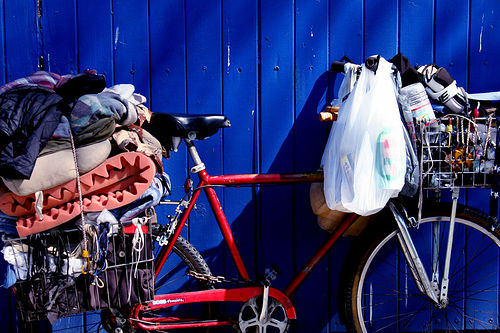So far in this series, we have examined the mental and emotional first steps to long-term travel in Taking The Leap, as well as answering the ever-present question: how much money do you need?
Vagabondish is reader-supported. When you buy through links on our site, we may earn a small affiliate commission. Read our disclosure.
Now that you are in the thick of preparing to leave your life of routine and comfort for one of new experiences and adventure, there are a number of things you can do logistically to get ready and make things much easier for yourself once you are on the road.
Getting Rid of All Your Crap
If you are going away for a short or temporary period of time, or if you have a house you won’t be selling where you will continue to keep all your belongings, then this task may not be as applicable for you.
Getting rid of all (or most, or even some) of your possessions is one of the toughest things to do, but one that is illuminating and immensely freeing. Only once you are up to your eyeballs in “stuff”, deciding what to keep, and what the heck to do with the rest, will you realize just how entrenched we all can get with constant materialistic messages encouraging us to “buy buy buy”.
I write specifically about the step-by-step process of getting rid of all your crap here, for your reference. Here is a little extra food for thought:
Do you have somebody who can store your belongings?
Of course this may seem ideal, but don’t rely on the excuse of having a spacious place to store your stuff as a way to avoid dealing with all the crap you have. You’ll likely end up coming home and realizing that you don’t need most of it, and will have to deal with getting rid of it then! Or conversely, you might have anxiety over what condition your stuff is in while you are away, impeding your enjoyment on the road.
I know I know: you love that cutlery. Ooh Ooh – and you couldn’t possibly get rid of that funky bedspread; where else will you find one like it again? Pick and choose carefully the things you will keep. You may find upon your return an even better set of cutlery for a steal, and you will have picked up a bedspread in Peru that far outshines your funky one and it has a great story to go along with it to boot. For myself I kept only the things that I considered to be priceless (heirlooms, and things I’ve accumulated on world travels thus far). I also kept anything I would most certainly need again and wouldn’t be able to sell at all.
Believe me — it is truly liberating to free yourself of “stuff” before moving forward on a journey of this nature. Try it!
What to do with the proceeds of selling your stuff:
If you are selling furniture, cars, and having garage sales, then you are accumulating some cash. You can use this cash to fund your travels by adding it to your “magic number” account, but once you return home to set up shop again, you may not have two pennies to rub together. This is a very dangerous strategy.
Instead, consider opening up a separate savings account (similar to the type of account you are using to save for the trip), solely dedicated to stashing the proceeds of selling your stuff and outfitting a new home again when you return.
International Driver’s License
If you plan to travel in a foreign language country and will rent or buy a car, then you will most likely require an International Driver’s License. It is good for one year, and serves as a convenient official piece of photo ID. It is a booklet that includes all the details of your driver’s license, translated into all major foreign languages.
You can apply for your International Driver’s License through your local Automobile’s Association.
Travel Insurance
Although some vagabonds prefer to “roll the dice” and choose to omit travel insurance, it is recommended that at least for the first leg of your journey you go with insurance. You will find some basic information on some of the differences in policies and where to find quotations here, in order to help you in your search.
Some additional food for thought:
- If you live in Canada and have provincial health coverage …
Check out the provincial requirements and restrictions on making claims. Also, find out how long you can be out of the province before your coverage is suspended. In many cases, if you will be away for longer than that specified period of time, you can apply for a “vacation” to allow you to leave the province for longer than the allotted time and still remain covered. - If you are taking a sabbatical and have extended health coverage through work …
Find out if your extended health plan will cover you during your absence from work. Also, call them and ask questions about the specific levels and parameters of your coverage (as outlined here); you don’t want to find out the hard way that your broken leg isn’t covered while lying on the hospital bed and facing a hefty bill.
Automating Your Bills
You don’t want to burden friends or family with paying your bills while you are away — it’s onerous and annoying. So try to eliminate all the bills you possibly can, and automate the rest.
Most companies will allow you to pay automatically each month through credit card billing. This works out nicely, because if you are remotely located somewhere with intermittent internet access, you only have to worry about paying one bill each month: your credit card bill. And most credit cards too, can be paid online.
If you can’t (or choose not to) automate your bill payments with credit cards, then register all of your bills online through your bank; automatic deductions wherever possible are good — but make sure you always have enough money in your bank account to cover the payments!
Alternately (and as a last resort — you don’t want to preoccupy yourself with this stuff), you can use an online service so you receive bill statements to your email inbox and proceed to pay them each manually through your bank account. With any of the above options, request the “paperless” option so that paper statements aren’t sent to you at all — you won’t need them and whoever is receiving your mail will be appreciative.
Selling Your Car: Letter of Insurance
Assuming you are selling your car, you’ll also be canceling your auto insurance. Be sure to ask your insurer for a letter of insurance, so that if you buy a car on the road (or when you get home again), you can present this letter to your new insurer as proof that you have had insurance in the past. In some cases it is a necessity; in others it will simply reduce your cost of insurance drastically and pave the way with a proven history of insurability.
And as with selling your belongings (as above), you may want to stash the proceeds from the sale of your car in a separate account dedicated to setting up your home again when you return.
Call Credit Card Companies: Travel Notes
If you don’t advise your credit card companies of upcoming travel, you could well find that transactions abroad are denied. If their system detects red flags (like uncommon purchasing activity or charges in different locations), your account will be temporarily suspended until you can verify with the credit card company that the transactions are legitimate.
Instead of going through this hassle and embarrassment, simply call your credit card companies in advance and advise them of your travel plans. They will make notes in the account, which will drastically reduce (but not necessarily eliminate) the chances of your account being frozen.
You will learn in the next issue of this series how credit card companies can reach you on the road if there are problems.
Copies of ID and Official Documents
If your passport is lost or stolen on the road, you stand a much better chance of having a new one issued and not ruining your travel plans if you have photocopies of all your ID.
Be sure to keep your originals and copies in separate places, and don’t carry both on you at the same time if it can be avoided (for example, once you are settled in a place, lock up your passport and just go out and about with the photocopy on your person).
Also, it is prudent to carry your travel insurance policy number and claims phone number so that if something happens to you unexpectedly, you (or whoever helps you if you can’t speak for yourself) can find the number with your ID and call your insurance company. In some cases, travel insurance won’t cover a claim if you don’t call them immediately, regardless of whether or not it was practical to call them at the time.
Arm Your Family or Friends at Home with Information
By now you should have designated a friend or family member at home to receive any mail that may arrive, and store the belongings that you are keeping until you return. There are a few things you can do for this person that will also help (both them and yourself):
- Provide them with copies of all your identification. This way if you are in a bind from afar (maybe you got drunk on a beach in Argentina and woke up naked, lost, hung over, and without any ID), you can contact them to help you, and they’ll have the appropriate copies to get you back on track.
- Provide them with all your insurance information: life insurance, travel insurance, and any other policies you own. If you find yourself in a hospital bed and you can’t find the insurance company information you thought you had in your wallet (or you have the inability to contact them yourself), you can call your friend in a pinch and they can make all the necessary calls to the insurance company on your behalf.
- Give them your banking information, including the institution, account and transit numbers, and possible passwords. By doing so, they can deposit any cheques that may arrive in the mail for you directly into your account. You likely won’t be able make deposits yourself if they forward the cheque to you unless the country you are visiting has your bank. And cheques at home left un-cashed for too long will become void.
Do your contact at home a favor in bombarding them with all this information: organize it nicely in a binder for them, with pockets so they can store any mail that comes for you while you are away.
Whew. Most of the logistics are out of the way. Now it’s time to prepare the stuff you need for your trip, and get going! Stay tuned for all this valuable information in the next installment of our Practical Guide to Vagabonding and Long Term Travel.




